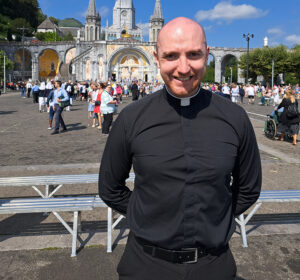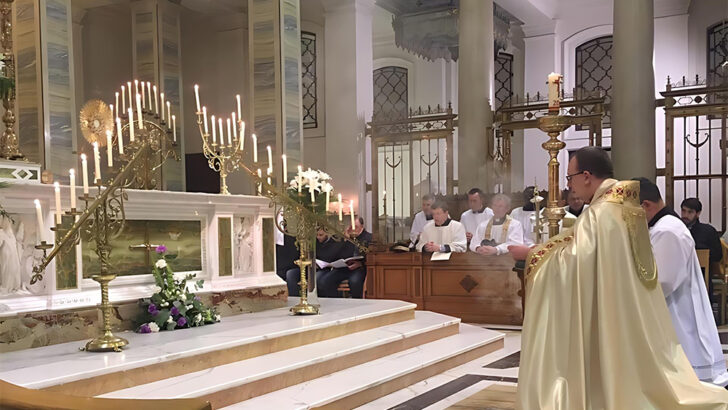Christ the King Cathedral, Mullingar, invites you to participate in these 40 Hours of Eucharistic Adoration, where faithful will come together as pilgrims of hope, seeking the face of Christ in the Eucharist beginning with the 7:30pm Mass on Friday, November 22, and concluding with Vespers and Benediction at 4pm on Sunday, November 24.
In a society increasingly distracted by screens and fast-paced living, a growing number of people are finding meaning and purpose through the tradition of Eucharistic adoration. Fr Barry White, a priest based in Mullingar, pointed out the power of adoration, noting the impact of groups like Youth 2000 and Pure in Heart as he told The Irish Catholic prior to the yearly event, ‘40 hours Adoration’, hosted in the Cathedral of Christ the King, Mullingar. “People have discovered their vocations through adoration,” he said.
Fr Barry noted the need for faith among people today, describing the importance of sacramental life in offering hope and guidance. “There is a profound calling for people to live out their baptismal and confirmation callings,” he added.
A central feature of the 40 Hours Adoration, hosted annually at the cathedral, is the sacrament of confession. “We encourage people to avail of the sacraments, to experience healing and forgiveness regularly as we journey through life,” Fr Barry said. With confession available from midday to midnight on Saturday, participants can rediscover this sacrament. The priest observed that, last year, many visitors, especially those who might not have initially intended to confess, often found themselves moved to do so. “Things come to mind during adoration, and they go to confession,” he noted, adding that many adults keep rediscovering confession after their initial preparation as children.
Reflection
Fr Barry described last year’s atmosphere as “beautiful… very prayerful and silent.” He acknowledged the popularity of secular practices like mindfulness, meditation, and yoga offer a sense of inner peace that many seek, yet “it is truly a desire for something that develop a deeper well-being… [yet Adoration] it’s not just our own well-being, it’s actually our relationship with God.” “40 Hours Adoration is an experience of this quiet peace and silence in front of the Blessed Sacrament,” he said. To support the faithful, guides are available to offer direction for those who may be unfamiliar with the practice of adoration, allowing them to fully experience the moments of listening and quiet reflection.
Reflecting on his own spiritual journey, Fr Barry shared that adoration played a significant role in his own vocational discernment. He described how he would visit the adoration chapel in his town during secondary school lunch breaks. “As a teenager, I’d have worries… I always felt a deep sense of peace and direction in adoration,” he said. “Adoration is a time of quiet prayer, to listen to the Lord and present issues or problems,” he explained, describing it as an opportunity for guidance.
Fr Barry described the ’40 Hours Adoration’ process as beginning with praise, followed by giving thanks, and then moving into a time of listening. “There are different ways of doing a holy hour,” he noted, adding that some may sit in silence, others may choose spiritual reading, and some might follow Ignatian steps of reflection. He compared this gradual approach to building physical strength, saying, “You can’t just jump into lifting 30 kilos if you’ve never done it before. Prayer can be the same. It’s gradual.”
He encouraged using scripture or the Rosary to aid in prayer, while also emphasising that silence and listening are key to developing a meaningful relationship with God”
Fr Barry also highlighted the importance of adoration groups within parish life, noting that these groups play a key role in helping people establish a deeper, more personal relationship with Christ. He expressed concern that the focus on increasing church activities can detract from the heart of faith. “Pope Francis’ recent document Dilexit Nos warns against neglecting the heart,” he explained. “Faith can’t just be participating in Mass by doing a reading or singing… it has to be deeper than that.” For Fr Barry, adoration is a way to cultivate this depth, placing relationship with Christ at the centre.

Many people, he observed, lack basic knowledge of faith and prayer practices, which are essential to building this relationship with Christ. He explained that a real connection with Christ comes “through silence, allowing the Lord to speak.” While secular practices like mindfulness and meditation are popular, he believes that the Church’s traditions meet this need on a deeper level. He noted that maintaining silence can be difficult for many, adding, “If I go into adoration, I might find silence hard to maintain. Two minutes can feel like a long time.” He encouraged using scripture or the Rosary to aid in prayer, while also emphasising that silence and listening are key to developing a meaningful relationship with God.
Giving
‘40 Hours Adoration’ coincides with the Feast of Christ the King, marking the end of the liturgical year. Fr Barry explained that the feast is a “beautiful celebration” that acknowledges Christ’s kingship at the conclusion of a procession of saints and feasts throughout the year. “It signifies trusting in Christ as our King,” he said. The event has consistently drawn large crowds, with many people, even those unfamiliar with silent prayer, seeking an encounter with Christ in the quietude of adoration. Fr Barry cautioned against viewing religious practices as transactional, stating, “The danger is that people think ‘I do something, and the Lord gives me something in return,’ which misses the heart of faith. It’s about bringing your heart to the Lord, giving thanks, seeking guidance, and forgiveness.” While cultural traditions like lighting candles or praying for success are meaningful, he believes adoration offers a deeper, more genuine connection to faith.
Throughout the Diocese of Meath, each parish takes part in the ‘40 Hours Adoration’, creating a sense of unity and pilgrimage as parishioners from various communities participate in prayer. During night hours, groups from Mullingar often take shifts, and each parish is assigned a specific time slot, creating a spirit of communal prayer and solidarity.
The ‘40 Hours Adoration’ follows a schedule reminiscent of the Easter Triduum, running from Friday to Sunday, and has become a cherished tradition in the cathedral. Fr Barry noted the symbolism of the event as a fitting conclusion to the liturgical year, offering a moment of reflection and renewal for all participants.
Fr Barry’s insights suggest that Eucharistic adoration offers people an alternative path: a place of peace, forgiveness, and purpose. As they discover and rediscover this practice, they may also find that it helps them to discern their vocations, nurture a deeper relationship with God, and embrace the gift of faith that grows in silence and community.


 Renata Milán Morales
Renata Milán Morales 40 hours Adoration, Christ the King Cathedral, Mullingar, 2023.
40 hours Adoration, Christ the King Cathedral, Mullingar, 2023. 